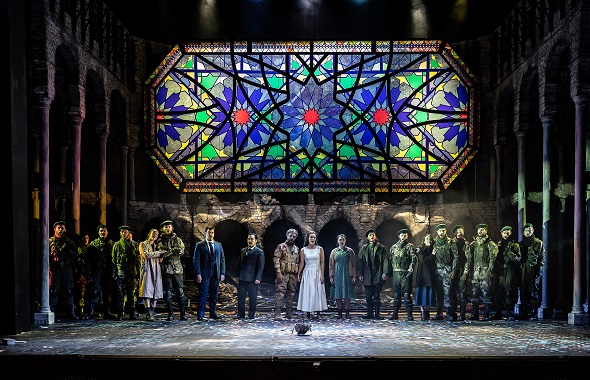
 Ireland Wexford Opera Festival 2023 [1] – Donizetti’s Zoraida di Granata: Soloists, Chorus and Orchestra of Wexford Festival Opera / Diego Ceretta (conductor). O’Reilly Theatre, National Opera House, Wexford, Ireland, 31.10.2023. (RB)
Ireland Wexford Opera Festival 2023 [1] – Donizetti’s Zoraida di Granata: Soloists, Chorus and Orchestra of Wexford Festival Opera / Diego Ceretta (conductor). O’Reilly Theatre, National Opera House, Wexford, Ireland, 31.10.2023. (RB)

Production:
Director – Bruno Ravella
Set and Costume design – Gary McCann
Lighting director – Daniele Naldi
Assistant Designer – Gloria Bolchini
Assistant Director – Noemi Piccorossi
Cast:
Zoraida – Claudia Boyle
Almuzir – Konu Kim
Abenamet – Matteo Mezzaro
Almanzor – Julian Henao Gonzalez
Ines – Rachel Croash
Ali Zegri – Matteo Guerzè
Dancer – Luisa Baldinetti
Dancer – Miryam Tomè
The theme of this year’s Wexford Opera Festival is, ‘Women & War’. Each of the three main operas which feature at the festival highlight different aspects of the struggles faced by women. While the theme was chosen some time ago it is particularly relevant to our own times given the current conflicts in Ukraine and in Israel/Gaza.
The festival opened with Donizetti’s Zoraida di Granata which the composer wrote when he was only 24. The work received its premiere in Rome in 1822 and it was Donizetti’s first major success. The initial production of the opera almost fell apart as the lead tenor became ill and there was no understudy. Donizetti hastily rewrote the part for contralto, and he then upgraded it when the opera was staged again two years later. Opera Rara released a recording of the original version of the opera written for tenor about 25 years ago. Wexford have followed their lead in this production in returning to Donizetti’s original version of the opera.
The background to the opera is the fifteenth-century war between the Spanish and the Moors over the territory of Granada. This backdrop of war pervades the work, but the opera is more concerned with the machinations of the three individuals within a love triangle. Almuzir, the king of Granada, is in love with Zoraida and he attempts to separate her from her lover, Abenamet who is a general in the army. Zoraida and Abenamet succeed in outmanoeuvring Almuzir, who is remorseful over his actions, and the lovers are reunited at the end of the opera.
I was not familiar with this opera prior to this production, and I have to say that I enjoyed the music very much. The first act is lively and contains many of Donizetti’s distinguishing characteristics while the second act has a darker, more dramatic mood. While there is much to enjoy there is nothing particularly memorable in the score that compares with Donizetti’s greatest operas. The plot was a little thin as it seemed solely concerned with the central love triangle while other key events happened off stage and were subsequently reported on by the main characters.
Bruno Ravella transferred the action from fifteenth-century Granada to the siege of Sarajevo in the twentieth century. All the main characters in the opera are Muslim and this was also the case in Sarajevo in the 1990s when the general population were subjected to a prolonged blockade. Gary McCann’s set consisted of the bombed-out National and University Library of Bosnia and Herzegovina. I liked the symbolism of using a library: the first casualties of war are always knowledge, culture and decency while at the same time these things provide the building blocks for the future peace. At various points in the opera an iron structure descended from the ceiling and at one point it formed the top of Abenamet’s prison cell. Almunzir and his henchman, Ali Zegri, both wore suits while the men in the army all wore combat fatigues. Zoraida wore a simple blue dress for the most part although she changed to a white dress later in the second half. The set and costumes were effective and underlined the extreme levels of stress all the main characters were being subjected to.
Claudia Boyle did an excellent job portraying the vulnerability, bravery and resourcefulness of Zoraida. In the opening scene she negotiated Donizetti’s vocal fireworks in an extraordinarily impressive virtuoso display. She was strong throughout the vocal register and her control of dynamics was excellent. Boyle gave the audience some blazing top notes and displayed a rich palette of tone colours. Her arias in Act II were more reflective and here she sang with a crystalline beauty of tone. Matteo Mezzaro successfully portrayed the valiant Abenamet; he injected ardour and passion into the love duets with Boyle. He did well in negotiating the vocal intricacies of Donizetti’s score although his voice revealed a pinched, nasal quality that affected the quality of tone.
Konu Kim portrayed the villainous Almuzir to perfection as he schemed, threatened and cajoled his way to marrying Zoraida. The end of the opera where he finally accepts his guilt is not dramatically convincing although this is the fault of the libretto rather than Kim’s performance. He sang with power and authority throughout the evening and his performance really caught fire in his final Act II aria which was deservedly greeted with ecstatic applause from the audience. Rachel Croash, Julian Henao Gonzalez and Matteo Guerzè also acquitted themselves well in their respective roles. Croash, in particular, displayed a gorgeous lyricism and powerful top notes in her first act aria.
Diego Ceretta ensured that cast, chorus and orchestra remained on track throughout the evening. The overture was exhilarating, and the orchestra did a magnificent job in performing Donizetti’s infectious jaunty themes. Ceretta gave the soloists space and flexibility to perform and there were a number of key moments where woodwind and string players provided a gorgeous accompaniment to the soloists. The all-male chorus gave a sterling performance throughout.
This was a first-rate performance from the Wexford Opera Festival with the plaudits going to Boyle and Kim.
Robert Beattie
